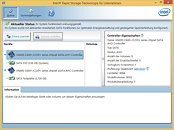Thursday, December 11th 2014

Intel Facing HEDT Chipset Troubles, Again?
In what is a repeat of the design issues Intel faced with its previous X79 Express chipset, over its integrated storage controller, leading to motherboard vendors redesigning their products with fewer SATA/SAS ports than the platform is capable of, the company is facing design troubles with its already-launched X99 Express chipset, which drives its latest Core i7-5xxx "Haswell-E" HEDT platform. Intel X99 Express is based on a common silicon, on which the company's enterprise C610 chipset is also based. On paper, it features as many as ten SATA 6 Gb/s ports. The storage controller has its own exclusive Rapid Storage Technology driver, marked "RSTe" on Intel's Download website.
Intel withdrew version 4.1.0.1046 of its RSTe drivers (even from the list of older drivers), and made its motherboard partners do the same. Replying to German publication Heise.de, ASUS explained that the driver was withdrawn because it doesn't support ATA TRIM command for SSDs striped in a RAID 0 array. The latest driver makes only six out of ten SATA 6 Gb/s ports visible to the operating system, and you can create RAID arrays using on these six ports. The other four ports become visible as part of a separate controller, only when a device is plugged into them. This controller is recognized by Windows' internal Standard AHCI controller driver. This also means that the four ports don't benefit from the SATA power management features the first six ports do, nor can they be part of a RAID array with drives plugged to the first six ports. Intel did not respond to the Heise article.
Source:
Heise.de
Intel withdrew version 4.1.0.1046 of its RSTe drivers (even from the list of older drivers), and made its motherboard partners do the same. Replying to German publication Heise.de, ASUS explained that the driver was withdrawn because it doesn't support ATA TRIM command for SSDs striped in a RAID 0 array. The latest driver makes only six out of ten SATA 6 Gb/s ports visible to the operating system, and you can create RAID arrays using on these six ports. The other four ports become visible as part of a separate controller, only when a device is plugged into them. This controller is recognized by Windows' internal Standard AHCI controller driver. This also means that the four ports don't benefit from the SATA power management features the first six ports do, nor can they be part of a RAID array with drives plugged to the first six ports. Intel did not respond to the Heise article.

30 Comments on Intel Facing HEDT Chipset Troubles, Again?
So, I really fail to see the issues here.
FWIW, the X99 platform as a whole, CPU included is over the top for most. I've stuck with X79 for over 3 years now and see no need to upgrade. If anything, Intel have been 'lazy' with progression due to market forces being less than pressing.
ON TOPIC: While I agree that this is a very minute issue, you have to wonder why they pulled the RSTe version though. If the SATA ports were divided over two seperate controllers from the get-go, what actually broke in this update?
1.) SATA ports 0-5 do not support TRIM on RAID 0
2.) SATA ports 6-9 do not install an Intel driver and revert to a standard Microsoft driver.
If you ask me, #2 is the bigger concern - you don't want a driver package that doesn't actually install a driver. It's good that Intel pulled the release; otherwise, people would install the newer release thinking it was better and more stable than the old one, which it obviously is not.
The first Sandy Bridge boards were pulled from sale because of a design flaw, a bunch of features were cut from X79 boards before launch because of problems. Z87 boards had a chipset hardware fault that luckily didn't affect too many people before revisions were made. Now they have issues with X99 that forced them to do a workaround. Maybe they need to more testing before rushing to market....
It has been 4 months since it came out and guess what? there's still a wide issue with memory competability on huge amounts of boards. Moreover, there are some issues that haven't resolved yet, critical issues. I haven't seen my X99's BIOS in months, becuase i cannot even access it. No updates.
On another note: After about 3 full months of release the errata on the X99/C610 has already grown to 9 pages, 25 items. My personal favorite is errata 22) SATA signal voltage violation exceeding ATA specification 3.1 for both tx and rx connector for any SATA I or II device with no plan to fix of course. The neat part is a similar erratum is in the 8 and 9 series PCH update but includes only SATA I devices... so they just doubled down and expanded that problem on the X99 to include any SATA 3Gb/s HDD or SSD you might use. A real bonus.
www.intel.com/content/www/us/...ec-update.html
It was well known before X99 launch the extra 4 SATA ports would run on the Microsoft AHCI controller, I can't see the other 3 drives on RST, but they are present on explorer and are all working properly at SATA 3 speeds.
I feel as if in the recent past, Intel is not only releasing chipsets but also processors one revision too soon. In their latest products, the early adopters have gotten burned because one major feature is broken at release and only fixed in a newer stepping that comes out months later. Intel should delay releases by a few months, produce one more stepping that fixes errata, then release that stepping as the only version.
For your Gaming G1: www.gigabyte.com/products/product-page.aspx?pid=5126#bios
forums.tweaktown.com/gigabyte/